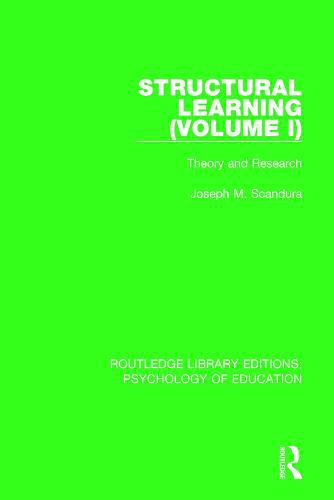Readings Newsletter
Become a Readings Member to make your shopping experience even easier.
Sign in or sign up for free!
You’re not far away from qualifying for FREE standard shipping within Australia
You’ve qualified for FREE standard shipping within Australia
The cart is loading…






Originally published in 1973, this book was published in two volumes. In the first volume, the author describes what he sees as the rudiments of three deterministic partial theories of structural learning. The first involves competence, partial theories which deal only with the problem of how to account for the various kinds of behavior of which people are typically capable. Special attention is given to mathematical competence. Nothing is said about learning or performance. The second partial theory is concerned with motivation, learning, and performance under idealized conditions, and is obtained from the first partial theory by imposing further structure on it. This theory says nothing about memory of the limited capacity of human subjects to process information. … The final theory is obtained from the second by making additional assumptions, which bring memory and finite information processing into the picture. The theory is still partial, however, since no attempt is made to deal with certain ultra-short-term behavioral phenomena which appear to depend directly on particular physiological characteristics.
$9.00 standard shipping within Australia
FREE standard shipping within Australia for orders over $100.00
Express & International shipping calculated at checkout
Originally published in 1973, this book was published in two volumes. In the first volume, the author describes what he sees as the rudiments of three deterministic partial theories of structural learning. The first involves competence, partial theories which deal only with the problem of how to account for the various kinds of behavior of which people are typically capable. Special attention is given to mathematical competence. Nothing is said about learning or performance. The second partial theory is concerned with motivation, learning, and performance under idealized conditions, and is obtained from the first partial theory by imposing further structure on it. This theory says nothing about memory of the limited capacity of human subjects to process information. … The final theory is obtained from the second by making additional assumptions, which bring memory and finite information processing into the picture. The theory is still partial, however, since no attempt is made to deal with certain ultra-short-term behavioral phenomena which appear to depend directly on particular physiological characteristics.